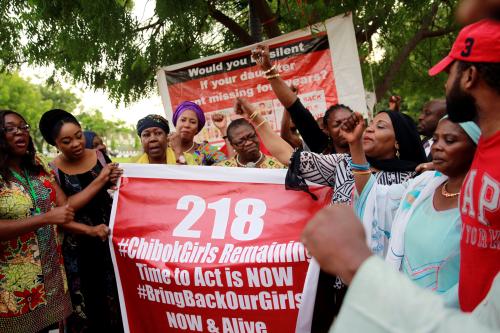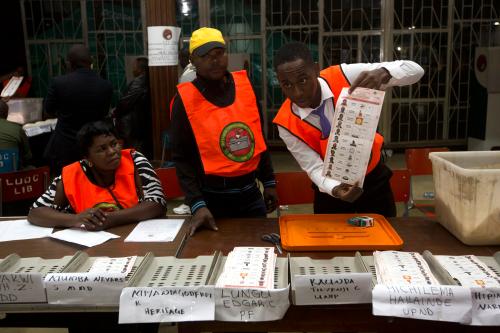The Democratic Republic of the Congo postpones November elections to April 2018
On Sunday, October 16, the government of the Democratic Republic of the Congo (DRC) declared that an African Union-mediated “national dialogue” among the ruling and several minor parties asserted that the country’s elections—originally planned for November—will be delayed until April 2018, allowing President Joseph Kabila to stay in power another 17 months. The country’s constitutional court had already allowed a delay because the electoral commission argued it did not have enough time to register all of the country’s voters and cited security obstacles. Kabila, whose 15 years in office were supposed to end on December 20, is constitutionally forbidden from a third term, and many of in the opposition fear that his ruling party will use this opportunity to change the constitution, much like what has been done in Burundi and Rwanda in recent months. Indeed, The Guardian reported that “At ‘national dialogue’ talks aimed at reducing tensions, it was concluded that the president was seeking to remain indefinitely.”
The opposition coalition—who had boycotted the dialogue—immediately rejected the decision and called for strikes, arguing that the change violated the constitution. On Wednesday, a widespread strike took place largely in the 10-million-people city of Kinshasa, with closed shops, empty schools, and quiet streets. Even before the decision had been made, protests and violence have broken out over what the opposition believes to be Kabila’s attempt to stay in power. Last month, around 50 people were killed in protests against the election delay, mostly casualties of the police, though the government blames the opposition and has prohibited further protests. In late September, the headquarters of the opposition were burned.
The September violence and electoral delay drew international attention, with the European Union and United States increasing sanctions due to the protests, and the EU threatening more if the elections are not conducted in a timely manner. Now, despite the U.N.-praised agreement, the deal still creates international concerns. According to Reuters, French Foreign Minister Jean-Marc Ayrault has already stated that the delay to 2018 “is not the answer to the crisis there and risks fueling an escalation in violence.” The U.S. embassy in Kinshasa has further noted that it is “both technically possible and important for the DRC to hold credible presidential elections in 2017.”
Uganda reduces interest rates and revises its tax plan
Professor Emmanuel Mutebile, governor of the Bank of Uganda, announced on Tuesday that the central bank had lowered its benchmark interest rate from 14 percent to 13 percent to pave the way for higher growth. This cut marks the bank’s fourth consecutive reduction of the rate this year as Uganda aims to support credit and growth while core inflation is low—around 4.8 percent. Earlier this month, the World Bank revised its 2016/17 growth projections downwardly for Uganda from 5.9 percent to 5.5 percent, citing a decline in investment and the drop in South Sudanese exports (due to the conflict) as major drains on the economy.
Meanwhile, the government is aiming to boost its domestic resource mobilization by widening the tax base—tapping into the informal sector and converting subsistence farming into commercial farming—as well as ensuring that imports are properly taxed. President Yoweri Museveni has called upon the Ugandan Revenue Authority (URA) to increase the country’s tax to GDP ratio from nearly 13 percent to 20 percent, which would require a tripling of last year’s tax collections. Some tax experts call this plan too ambitious because of the tax system’s current structural inefficiencies, small tax base, rampant exemptions, and low compliance and coverage levels, while others say it is in fact feasible, given that the URA is making the necessary linkages with relevant bodies (Uganda Registration Services Bureau, Kampala Capital City Authority, and Ministry of Lands) to make tax evasion more difficult.
Uber partners with Nigerian bank to provide drivers with loans while the airline Emirates considers suspending Abuja-Dubai flights
This week, ride-sharing company Uber announced a partnership with Nigeria’s First Bank in order to provide loans to drivers, as Nigeria’s present macroeconomic woes have rendered it difficult for drivers to afford cars. The bank will provide drivers with $7,930 loan at 20 percent interest with a 2-year repayment timeframe in order to buy a second-hand car. A second option offers a 22 percent interest rate with a 3-year repayment period. The driver must meet two conditions in order to qualify for the loan: demonstrate an average rating of 4.5 (out of 5) stars and provide proof of having earned more than $7,535 in the last six months. Uber expects that the new partnership will create new opportunities for growth among its driver-partners. According to Reuters, Uber has performed relatively well in Nigeria. The ride-sharing service has clientele ranging from students to hospital patients, filling a gap for the shortage of ambulances. Amid its success in Nigeria, the company has been looking to expand to French-speaking African countries.
As Uber is one example of a company that is strengthening its foothold in Nigeria, another established firm, the airline Emirates announced that it would be suspending its Abuja-Dubai operations indefinitely, starting October 30. However, it will continue to operate its daily Dubai-Lagos flights. Emirates previously operated four daily flights to Nigeria—2 to Abuja and 2 to Lagos. The company cites foreign exchange hurdles and low patronage as the reason for lower profitability and the scaling back of their operations. In September, Nigeria owed Emirates $680 million in ticket revenue, as the oil slump depleted the country’s foreign exchange reserves, thus delaying payments to the Dubai-based airline.
The Brookings Institution is committed to quality, independence, and impact.
We are supported by a diverse array of funders. In line with our values and policies, each Brookings publication represents the sole views of its author(s).








Commentary
Africa in the news: DRC delays elections; Uganda cuts interest rates, expands taxes; and Uber partners with Nigerian bank
October 21, 2016